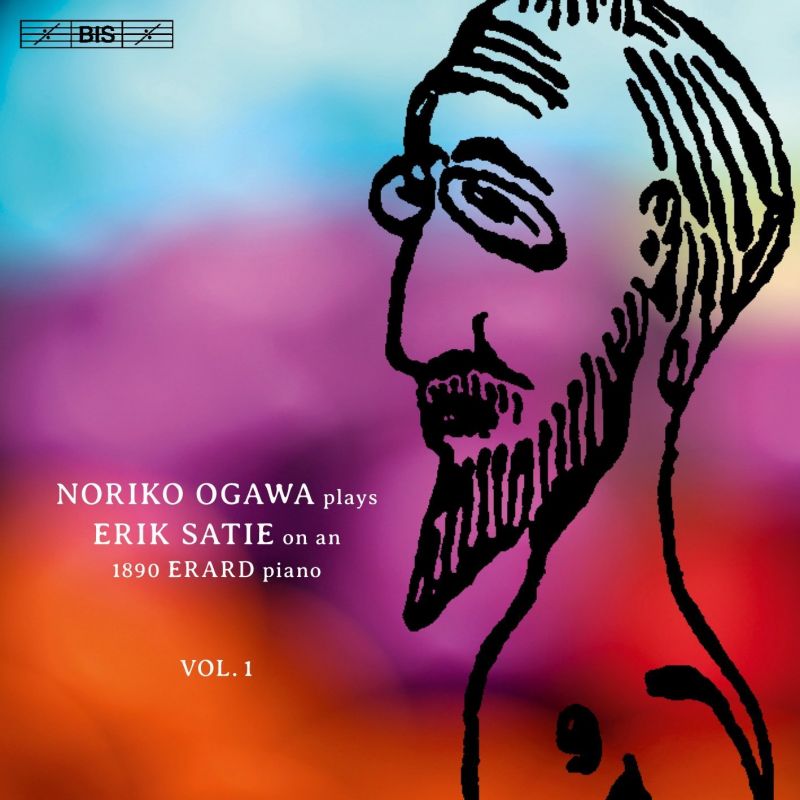Noriko Ogawa plays Satie; Olga Scheps: Satie
View record and artist detailsRecord and Artist Details
Composer or Director: Erik Satie, Chilly Gonzales
Genre:
Instrumental
Label: RCA Red Seal
Magazine Review Date: 08/2016
Media Format: CD or Download
Media Runtime: 64
Mastering:
DDD
Catalogue Number: 88985 30540-2

Tracks:
| Composition | Artist Credit |
|---|---|
| (6) Gnossiennes |
Erik Satie, Composer
Erik Satie, Composer Olga Scheps, Piano |
| (5) Grimaces for 'A Midsummer Night's Dream' |
Erik Satie, Composer
Erik Satie, Composer Olga Scheps, Piano |
| (3) Gymnopédies |
Erik Satie, Composer
Erik Satie, Composer Olga Scheps, Piano |
| Je te veux |
Erik Satie, Composer
Erik Satie, Composer Olga Scheps, Piano |
| (3) Sarabandes |
Erik Satie, Composer
Erik Satie, Composer Olga Scheps, Piano |
| Tendrement |
Erik Satie, Composer
Erik Satie, Composer Olga Scheps, Piano |
| Gentle Threat |
Chilly Gonzales, Composer
Chilly Gonzales, Composer Olga Scheps, Piano |
Composer or Director: Erik Satie
Genre:
Instrumental
Label: BIS
Magazine Review Date: 08/2016
Media Format: Super Audio CD
Media Runtime: 78
Mastering:
DDD
Catalogue Number: BIS2215

Tracks:
| Composition | Artist Credit |
|---|---|
| (6) Gnossiennes |
Erik Satie, Composer
Erik Satie, Composer Noriko Ogawa, Piano |
| (Le) Piccadilly |
Erik Satie, Composer
Erik Satie, Composer Noriko Ogawa, Piano |
| Chapitres tournés en tous sens |
Erik Satie, Composer
Erik Satie, Composer Noriko Ogawa, Piano |
| Avant-dernières pensées |
Erik Satie, Composer
Erik Satie, Composer Noriko Ogawa, Piano |
| Croquis et agaceries d'un gros bonhomme en bois |
Erik Satie, Composer
Erik Satie, Composer Noriko Ogawa, Piano |
| Sonatine bureaucratique |
Erik Satie, Composer
Erik Satie, Composer Noriko Ogawa, Piano |
| Poudre d'or |
Erik Satie, Composer
Erik Satie, Composer Noriko Ogawa, Piano |
| Embryons desséchés |
Erik Satie, Composer
Erik Satie, Composer Noriko Ogawa, Piano |
| (3) Descriptions automatiques |
Erik Satie, Composer
Erik Satie, Composer Noriko Ogawa, Piano |
| Heures séculaires et instantanées |
Erik Satie, Composer
Erik Satie, Composer Noriko Ogawa, Piano |
| Prélude en tapisserie |
Erik Satie, Composer
Erik Satie, Composer Noriko Ogawa, Piano |
| (3) Valses distinguées du précieux dégoûté |
Erik Satie, Composer
Erik Satie, Composer Noriko Ogawa, Piano |
| Je te veux |
Erik Satie, Composer
Erik Satie, Composer Noriko Ogawa, Piano |
| (3) Gymnopédies |
Erik Satie, Composer
Erik Satie, Composer Noriko Ogawa, Piano |
Author: Philip Clark
Neither of these two new releases quite nails those bewitchingly eccentric kinks as persuasively as existing contenders like Aldo Ciccolini, Claire Chevallier or Philip Corner, although the Cologne-based pianist Olga Scheps comes tantalisingly close. The programming of Noriko Ogawa’s first volume (I presume of Satie’s complete piano music, although that is not stated explicitly) is certainly a draw with likes of the rarely heard Embryons desséchés and Heures séculaires et instantanées placed in the mix alongside evergreens such as the Gnossiennes, Sonatine bureaucratique, Trois Gymnopédies and Je te veux. But Ogawa too often carries on as if it’s harmonic business as usual: her Gymnopédies have a slight air of triumphalism, while Le Piccadilly (Marche) and Avant-dernières pensées feel too much like generic neo-classicism.
Ogawa performs on an 1890 Erard but attacks it as if she’s manoeuvring a modern grand: the subtle palette of painterly colours and brush-strokes that characterise Claire Chevallier’s compelling album (Zig-Zag Territoires, 11/09) shows how the instrument can be made to resonate in sympathy with Satie’s music. Olga Scheps plays on a new-fashioned grand piano, and even since I mentioned her in the previous paragraph I’ve warmed to her approach. Now the Gymnopédies feel appropriately stately and objectified, while her Sarabande in F minor emphasises that actually F minor is being kept on only as a retainer: Scheps keeps Satie’s harmonically detached chords floating in a continuum of non sequiturs.
The sixth Gnossienne, which appears on both discs, turns up something of a mystery. Neatly dispatched by Ogawa in just over a minute (there’s no tempo indication in Satie’s score but he gives a preferred duration of 1'20"), Scheps stretches its structure to 2'30". I’m not certain why – lengths of time over harmony taken too far, perhaps?
Discover the world's largest classical music catalogue with Presto Music.

Gramophone Digital Club
- Digital Edition
- Digital Archive
- Reviews Database
- Full website access
From £8.75 / month
Subscribe
Gramophone Full Club
- Print Edition
- Digital Edition
- Digital Archive
- Reviews Database
- Full website access
From £11.00 / month
Subscribe
If you are a library, university or other organisation that would be interested in an institutional subscription to Gramophone please click here for further information.




